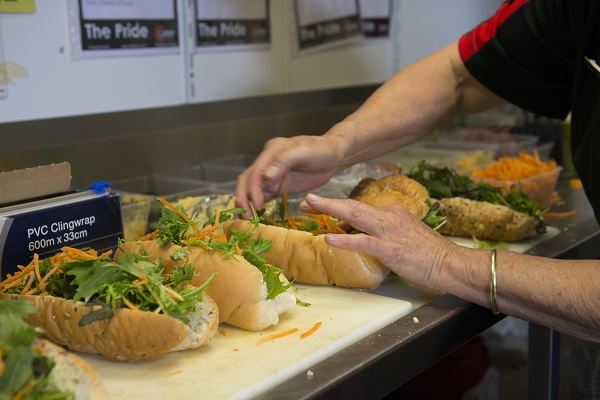
Third-year Bachelor of Culinary Arts learners have developed a student-focused smorgasbord comprising no fewer than 14 dishes, ranging from pumpkin and kumara soup to chicken and tofu pad Thai. There are also vegan and gluten-free options, included a gluten-free chocolate self-saucing pudding.
In total, the team is aiming to produce, pack and freeze 1000 meals, which will be delivered to learners by Otago Polytechnic’s Student Success team and others.
“We are now starting to pack and freeze the meals,” says Otago Polytechnic Bachelor of Culinary Arts Senior Lecturer Tony Heptinstall.
“We have used this opportunity to continue our on-campus teaching. We had a class last week with both on-campus and online students in isolation and the challenge was to come up with a range of dishes that would appeal to students. There are currently 14 different meal options.
“The students are getting a unique opportunity to produce food in bulk and examine their processes. They are able to incorporate all this learning into the formal assessment for our third-year Bachelor of Culinary Arts programme.”
As Dr Adrian Woodhouse, Head of Culinary Arts and Food Design, notes: “Despite the Covid context, this illustrates a typical strength of our teaching approach, which is quickly repositioning our students’ learning activities to embrace the needs of the community.”
Currently, there are a few hundred active cases within Otago Polytechnic’s student community.
Our focus at this time is to ensure that any person who is isolating is ok, has access to what they need, and has good support around them,” says Dr Megan Gibbons, Chief Executive Otago Polytechnic.
“We have teams who continue to monitor their wellbeing and connect with them daily.
“We’ve been busy phoning impacted students to check on their welfare. The majority of those we have contacted have indicated they are doing fine. We’re supporting a small percentage with food and, in some cases, medicine deliveries.
“We know how important it is to start the year on a positive note. We also understand that this will be the first time some of our learners have been away from home for an extended period,” Dr Gibbons says.
“From planning, purchasing, packing and delivering food and care packages, to spending time calling those in isolation, we are attempting to help in a range of ways.
“From our Learner Services and Student Success teams, Te Punaka Ōwheo, student ambassadors, to whānau members and others, many have gone above and beyond, largely in their own time, to support our taiura.
“Allied to this has been the immense work of our academic teams, whose efforts and expertise have greatly smoothed the way for many learners.
“We acknowledge this is a stressful time. We urge any students who feel scared or anxious, have questions or need support in any way, to contact our Student Support teams. Likewise, we urge staff to utilize our support systems,” Dr Gibbons says.
“We are following all Government and TEC guidelines and recommendations and will continue to review and update our processes.”
The much-delayed English draft curriculum is now out for consultation, generating discussion from teachers.
Research from AUT demonstrates arts, culture and recreation have positive impacts on all aspects of…
How effective has the school phone ban been in achieving its aims? Researchers from the…
School camps and excursions deliver hands on learning experiences, helping to consolidate classroom learning.
Innovations in AV technologies present new opportunities to engage with students. We look at how…
A new report from the University of Auckland’s Our Voices Project asks young people what…
This website uses cookies.